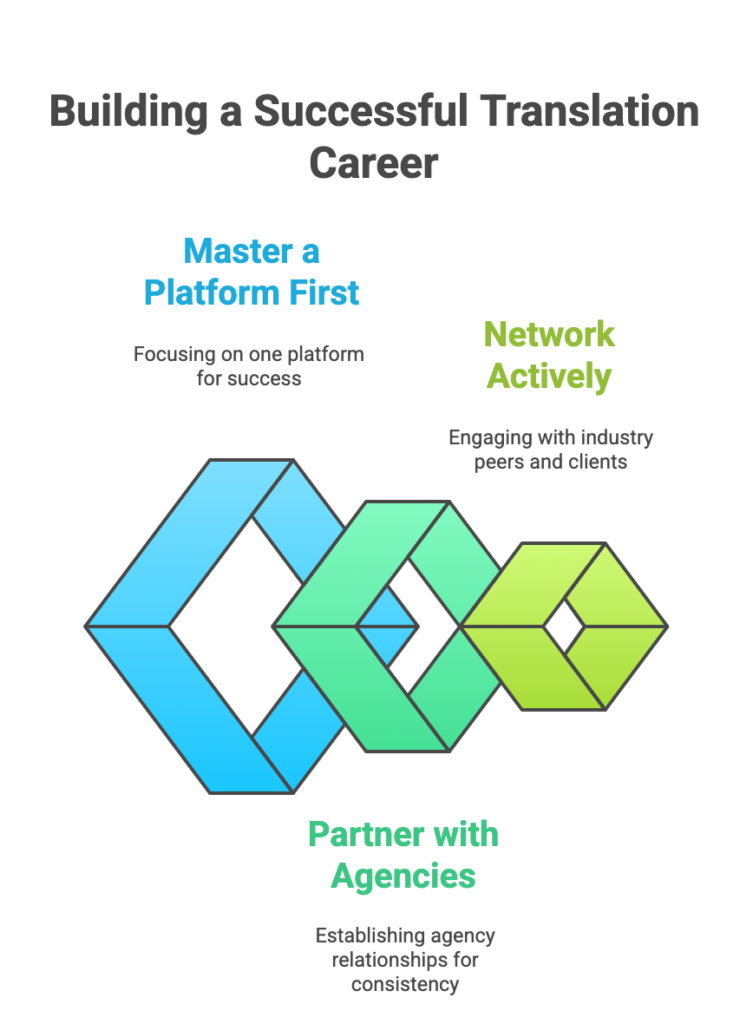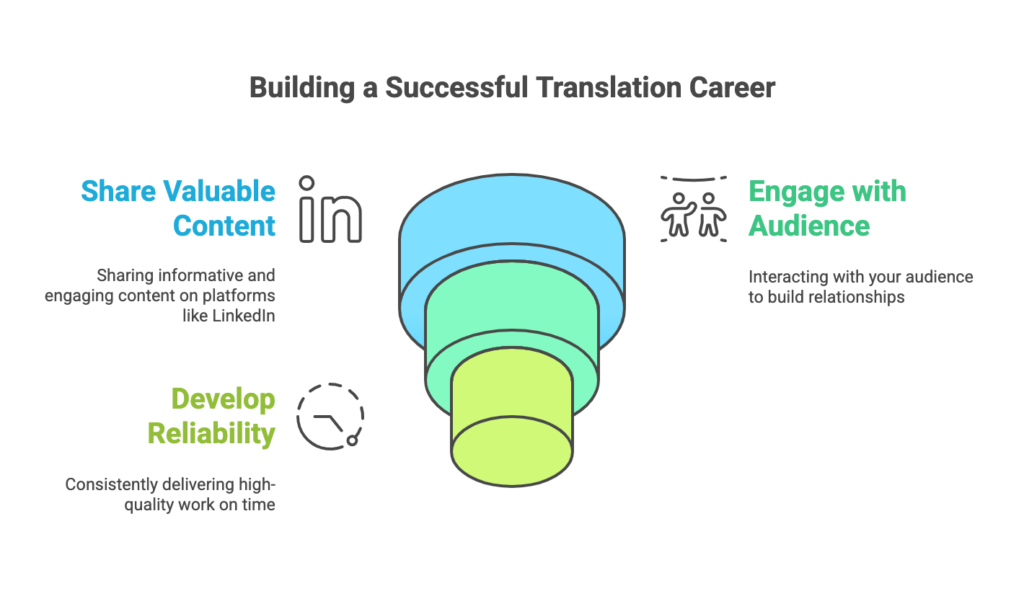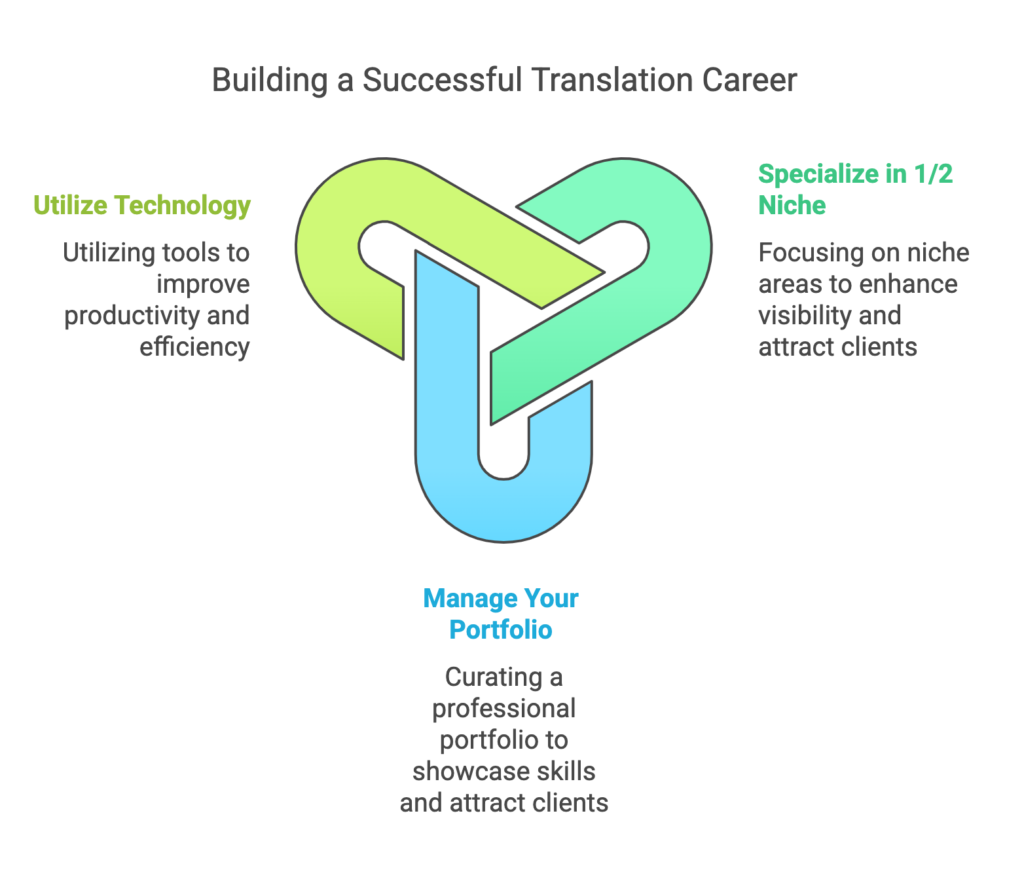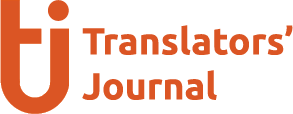The translation industry is continuously growing! It is predicted to keep its average 7% growth till 2028 (see: The 2024 NIMDZI 100 report).
Does this mean more translation jobs for you?
According to ProZ.com, the demand for freelance translators grew by 43% in 2024! Yet, many qualified linguists struggle to find consistent work.
Let’s explore 9 actionable tips to help you stand out and secure more translation projects in the coming year.
Want to work as a translator? Here’s the honest truth: translation work isn’t easy money. You really need to love working with words to enjoy this job.
To do well, you need three key things:
- Keep working at it every day
- Don’t give up when things get tough
- Be patient while building your career
Remember, everyone’s path is different. What works for others might not work for you. Look at your own strengths and situation, then make a plan that fits you best.
Every day is a new day. It is better to be lucky. But I would rather be exact. Then when luck comes you are ready.
Ernest Hemingway, The Old Man and the Sea
Be in the Right Places
Want to get regular translation work? You need to get noticed by the right people. This means:
- Looking for jobs where clients can find you
- Meeting and talking with people who need translators
- Being active in places where translation work happens
Think of it like a shop – you want to set up where customers will see you. The more visible you are to people needing translations, the more likely you are to get work and build trust with clients.
The first 3 tips will guide you to be in the right places. Let’s jump in!

Tip 1. Focus on One Job Website First
Pick one website where translators find work (like Upwork, Freelancer, or Fiverr) and really learn how to use it well. This works better than trying to use many websites at once.
Here’s what to do:
- Choose one website and keep using it until you earn at least $10,000
- Learn everything about how the website works, like: • How to make your profile look good • How to find good jobs • How to talk to clients
- Watch out for common problems like: • Scammers trying to trick you • Breaking the website’s rules by accident • Getting your first job (this can be tough!)
Think of it like learning to play a video game – the more you practice on one platform, the better you get at it. Once you’re really good at one website, it’s much easier to get jobs there.
Tip 2. Keep Partnering With Translation Agencies
Working with translation agencies is smart because they:
- Have lots of regular clients
- Give you different types of work
- Can keep you busy year-round
What to do:
- Sign up with the best agencies
- Take their tests to show your skills
- Have your papers ready (resume, certifications)
- Work with different types of agencies
- Try both small and large companies
- This gives you more chances to get work
- Keep track of your agency clients
- Make a list with: • Their contact info • Past jobs • When they pay • Any problems you’ve had
- This helps you remember which ones are good to work with
- Pick good partners
- Work with agencies that: • Pay fair rates • Treat you well • Do honest business
- Stay away from agencies that don’t meet these standards
Think of agencies like regular customers at a shop – it’s better to have several good ones than always looking for new ones.
Tip 3. Be in Your Network
By actively participating in your network, building relationships, and seeking referrals, you can increase your visibility, attract new clients, and stay ahead of the competition. Build and nurture your professional network so you can get ahead in your career.
- Define Your Network: Your network includes everyone you interact with as a translator, from project managers and clients to colleagues and industry professionals. Consider your network from both geographic (e.g. local, national, international) and online/offline perspectives.
- Be Active in Your Network: Participate in online forums, groups, and social media communities related to translation. Attend industry events, conferences, and meetups both online and offline.
- Build Relationships: Create and maintain strong relationships with colleagues, clients, and industry professionals. This can involve exchanging information, collaborating on projects, or providing mutual support.
- Seek Referrals: Referrals are often the best source of new clients. By building strong relationships within your network, you can increase your chances of being recommended to potential clients.
- Join Associations and Groups: Participate in industry associations, groups, and events to connect with other translators and industry professionals. This can help you stay informed about industry trends, expand your network, and discover new opportunities.
Build the Right Habits
Building strong habits requires discipline and dedication, but the rewards in terms of increased job satisfaction and career advancement are well worth the effort. The next three points are habits that you build everyday.

Tip 4. Keep Getting Better
Continuous learning is essential for a successful translation career. By staying updated with the latest trends, taking courses to enhance your skills, and seeking feedback from others, you can position yourself as a top-quality translator and attract more clients. Remember, the translation industry is constantly evolving, and staying ahead of the curve is key to long-term success.
- Stay Updated: Keep abreast of the latest translation technologies, industry trends, and best practices by following industry news, attending conferences, and participating in online forums.
- Take Courses: Enroll in online courses or workshops to enhance your translation skills and expand your knowledge in specific areas. Look for courses that cover translation technologies, language-specific topics, or specialized fields.
- Seek Feedback: Actively seek feedback from clients and colleagues to identify areas for improvement. Be open to constructive criticism and use it as an opportunity to grow and develop your skills.
- Learn from Mistakes: Analyze your past mistakes and learn from them to avoid repeating them in the future. Reflect on your work and identify areas where you can improve your efficiency, accuracy, or quality.
Tip 5. Share Useful Things Regularly
Consistently share valuable content. By doing so you can increase your visibility, establish yourself as a thought leader in your field, and attract new opportunities.
- Leverage LinkedIn: LinkedIn is a particularly effective platform for translators, as it is primarily focused on professional networking. Share your articles, blog posts, and other relevant content to demonstrate your knowledge and expertise.
- Share Useful Content: Focus on sharing content that is informative, engaging, and relevant to your target audience. This could include industry news, translation tips, case studies, or insights into your specialized fields.
- Engage with Your Audience: Interact with other users by commenting on their posts, participating in discussions, and answering questions. This will help you build relationships and increase your visibility.
- Showcase Your Work: Share samples of your translation projects, highlighting your skills and experience. This can be a great way to attract potential clients and demonstrate your capabilities.
- Build a Funnel and Lead Generation Process: While sharing content on social media may not immediately result in job offers, it can help you build a funnel of potential clients and generate leads over time. By consistently providing valuable content and engaging with your audience, you can attract interested parties and nurture them into paying customers.
Tip 6. Reliability and Accuracy Your Currency
Develop a reputation to be reliable and responsive. By consistently delivering high-quality work on time and providing excellent customer service, you can establish a strong reputation and attract loyal clients.
- Be Professional and Reliable: Demonstrate your professionalism and reliability by consistently delivering work that meets or exceeds client expectations. Develop a reputation for being responsive, punctual, and easy to work with.
- Hit Your Deadlines: Make meeting deadlines a habit by planning your work effectively and managing your time efficiently. This will show clients that you are reliable and respect their time constraints.
- Communicate Regularly: Maintain open and clear communication with clients throughout the project. Keep them updated on progress, address any concerns promptly, and be transparent about potential challenges or delays.
- Provide Excellent Customer Service: Go above and beyond to provide exceptional customer service. This includes being responsive to client inquiries, addressing feedback constructively, and always striving to exceed expectations.
- Address Feedback: Be open to feedback and use it as an opportunity to improve your work. Make necessary revisions promptly and communicate with clients about the changes you’ve made.
Have Right Strategies
A well-thought-out strategy is essential for a thriving translation career. But as a start, let’s build it on three key considerations.

Tip 7. Specialize a Niche or Two
Specializing in one or two niche areas can significantly enhance your visibility and attract more targeted clients. By focusing on specific fields, you can deepen your expertise, build a strong reputation, and differentiate yourself from other translators.
- Identify Your Niches: Determine areas of expertise where you have a competitive advantage, such as medical, legal, or technical translation. Consider your interests, experience, and the demand for translators in specific fields.
- Avoid Overly Broad Niches: While terms like “marketing” or “finance” may seem relevant, they are too broad to be considered true specializations. Aim to narrow down your focus to more specific areas, such as “fashion marketing” or “cryptocurrency.”
- Showcase Your Expertise: Highlight your specialization on your website, in your marketing materials, and on your social media profiles. Use keywords related to your niche to improve your visibility in search engine results.
- Target Clients in Your Niche: Focus your marketing efforts on clients in your specialized area. Research companies and organizations that operate in your niche and reach out to them directly.
- Network with Professionals in Your Niche: Attend industry events, join online communities, and connect with professionals in your specialized field to expand your network and discover new opportunities.
Tip 8. Keep an Updated Portfolio
A well-curated portfolio is a powerful tool for showcasing your translation skills and attracting potential clients. By presenting your best work in a professional and organized manner, you can demonstrate your expertise and build credibility in the industry. Here is how you can do this:
- Have a Website: Create a professional website or online portfolio to showcase your translation services, qualifications, and samples of your work. This will serve as a central hub for potential clients to learn more about you and your capabilities.
- Showcase Completed Projects: Once you complete a project, consider adding it to your portfolio, provided you have permission to share the content. When adding samples, be sure to anonymize any identifiable information to protect client confidentiality. This can involve removing names, company logos, or specific details that could compromise privacy.
- Highlight Your Skills: Use your portfolio to highlight your specific translation skills, such as language pairs, subject matter expertise, and software proficiency. This will help potential clients quickly assess your suitability for their projects.
- Include Client Testimonials: If you have permission, include positive testimonials from satisfied clients to demonstrate your track record and build trust.
- Update Often: Keep your portfolio and resume up-to-date by regularly adding new samples of your work and highlighting any recent achievements or certifications. This will show that you are committed to continuous improvement and staying relevant in the field.
Tip 9. Choose Your Stack of Technology Tools
By selecting the right technology tools and learning how to use them effectively, translators can significantly improve their productivity and efficiency. Incorporating these tools into your workflow can help you deliver high-quality translations, meet deadlines, and stay competitive in the translation industry.
- Translation Memory Tools (TMs): TMs store previously translated segments, allowing translators to reuse them in future projects. This can significantly speed up the translation process and ensure consistency across documents.
- Computer-Aided Translation (CAT) Tools: CAT tools provide translators with various features, such as spell checking, grammar checking, and terminology management. They can also integrate with TMs to further streamline the translation process.
- Cloud-Based Translation Platforms: These platforms offer cloud-based translation services, allowing translators to work remotely and collaborate with clients and colleagues. They often include features such as project management, quality assurance, and payment processing.
- Terminology Management Tools: These tools help translators manage and maintain consistent terminology throughout their projects. They can be used to create and update glossaries, ensuring that terminology is used correctly and consistently across different documents.
- Machine Translation (MT) Tools: While MT tools are not a substitute for human translators, they can be used as a starting point for translations, saving time and effort. However, it’s important to carefully review and edit MT output to ensure accuracy and quality.
In today’s competitive translation market, it’s essential to be proactive and strategic in your career development. Be in the right places, build the right habits, and implement right strategies to ensure consistent work. Remember, success as a translator requires a combination of talent, dedication, and a willingness to adapt to change.



